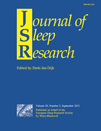Caffeine protects against increased risk-taking propensity during severe sleep deprivation
Summary
Previous research suggests that sleep deprivation is associated with declines in metabolic activity within brain regions important for judgement and impulse control, yet previous studies have reported inconsistent findings regarding the effects of sleep loss and caffeine on risk-taking. In this study, 25 healthy adults (21 men, four women) completed the Balloon Analog Risk Task (BART) and Evaluation of Risks (EVAR) scale at regular intervals to examine behavioral and self-reported risk-taking propensity during 75 h of continuous sleep deprivation. Participants received either four double-blind administrations of 200 mg caffeine (n = 12) or indistinguishable placebo (n = 13) gum bi-hourly during each of the 3 nights of sleep deprivation. No significant effects of drug group or sleep deprivation were evident on the BART or EVAR when measured at 51 h of wakefulness. However, by 75 h, the placebo group showed a significant increase in risk-taking behavior on the cost–benefit ratio and total number of exploded balloons on the BART, whereas the caffeine group remained at baseline levels. On the EVAR, several factors of self-reported risk-taking propensity, including total risk, impulsivity and risk/thrill seeking, were reduced among subjects receiving caffeine across the 3 days of sleep deprivation, but remained at baseline levels for the placebo group. These results suggest that 3 nights of total sleep deprivation led to a significant increase in behavioral risk-taking but not self-reported perception of risk-propensity. Overnight caffeine prevented this increase in risky behavior.




